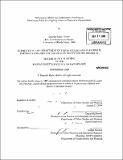| dc.contributor.advisor | Ceasar McDowell. | en_US |
| dc.contributor.author | Martin, Danielle Marie, M. C. P. Massachusetts Institute of Technology | en_US |
| dc.contributor.other | Massachusetts Institute of Technology. Dept. of Urban Studies and Planning. | en_US |
| dc.date.accessioned | 2010-05-25T20:53:36Z | |
| dc.date.available | 2010-05-25T20:53:36Z | |
| dc.date.issued | 2009 | en_US |
| dc.identifier.uri | http://hdl.handle.net/1721.1/55145 | |
| dc.description | Thesis (M.C.P.)--Massachusetts Institute of Technology, Dept. of Urban Studies and Planning, 2009. | en_US |
| dc.description | "September 2009." Cataloged from PDF version of thesis. | en_US |
| dc.description | Includes bibliographical references (p. 201-206). | en_US |
| dc.description.abstract | The advantages of participation, collaboration, and iteration shape the functionality of media tools like blogs, social networks, and user-created media sharing sites. At first glance, these tools should easily align with the stated values of many community and youth development organizations perched on edge of the digital divide in both the U.S. and abroad. The most critical growing disparity, thus, is not only access to these tools but also their integration into local programs that aim to empower individuals and build collective power. By adapting Edgar Schein's model of organizational culture, the author built a new methodology to investigate if facilitating the use of participatory media tools can also include a reflective realignment of program and curricular actions to core individual beliefs and organizational values. Through reflective analysis of the author's own practice, this thesis documents the evolution of a facilitation strategy to use participatory media training as a point of entry into community organizations. It argues that through collaborative and iterative reflection, an outside facilitator can: (1) foster individual voice and participation, (2) create critical moments to articulate and decipher an organization's culture, and (3) challenge, and therefore transform, how an organization learns and adapts. To develop this framework, this thesis relies on two core cases in Lawrence, MA and Bangalore, India, focusing on critical moments on a narrative timeline and analysis of like patterns of action. | en_US |
| dc.description.abstract | (cont.) The outcome of this investigation is a discussion of how and why community practitioners should add this new dimension to their facilitation, to not only spark media storytelling and member activism but also to improve an organization's internal practices. | en_US |
| dc.description.statementofresponsibility | by Danielle Marie Martin. | en_US |
| dc.format.extent | 211 p. | en_US |
| dc.language.iso | eng | en_US |
| dc.publisher | Massachusetts Institute of Technology | en_US |
| dc.rights | M.I.T. theses are protected by
copyright. They may be viewed from this source for any purpose, but
reproduction or distribution in any format is prohibited without written
permission. See provided URL for inquiries about permission. | en_US |
| dc.rights.uri | http://dspace.mit.edu/handle/1721.1/7582 | en_US |
| dc.subject | Urban Studies and Planning. | en_US |
| dc.title | Participatory media and collaborative facilitation : developing tools for aligning values to practice in organizations | en_US |
| dc.type | Thesis | en_US |
| dc.description.degree | M.C.P. | en_US |
| dc.contributor.department | Massachusetts Institute of Technology. Department of Urban Studies and Planning | |
| dc.identifier.oclc | 599881007 | en_US |
